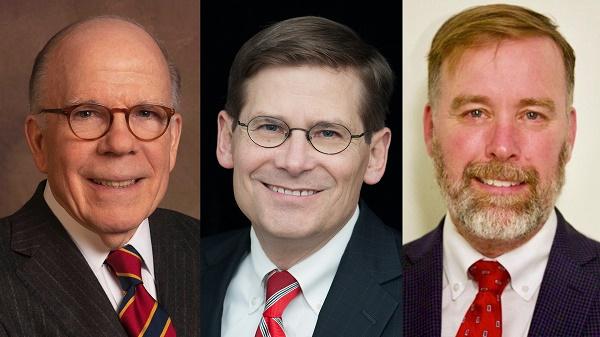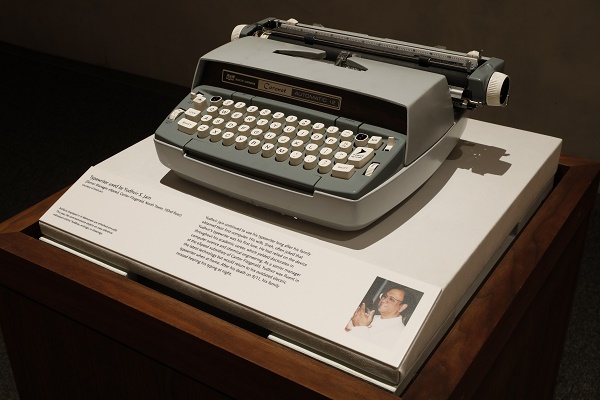Make a donation to the Museum
Former CIA Officers to Speak at 9/11 Memorial Museum
Former CIA Officers to Speak at 9/11 Memorial Museum

On Thursday, Sept. 26, former Central Intelligence Agency Acting Directors John McLaughlin and Michael Morell and former CIA Senior Paramilitary Officer Phil Reilly will participate in a public program at the 9/11 Memorial Museum, in partnership with the CIA. McLaughlin, Morell and Reilly will discuss how the Agency was uniquely positioned to support policymakers and military operations in the crucial 15 days immediately following the attacks, as well as how 9/11 ushered in a new era of intelligence work.
From their unique vantagepoints within the Agency, we asked McLaughlin, Morell and Reilly to tell us their 9/11 stories and what they remember about this tumultuous and uncertain time.
9/11 Memorial & Museum: Where were you on September 11, 2001? What is your memory of that day?
John McLaughlin: On 9/11, I was at CIA headquarters. When the attacks occurred, we assumed this was the al-Qaeda attack we had been fearing but had been unable to detect in advance. Later that morning, our initial assumption was confirmed, when one of our analysts obtained the manifest of the plane that had struck the Pentagon and we recognized the names of two al-Qaeda operatives we had been searching for. The remainder of the day was spent in video conferences with President George W. Bush and other national security officials and planning our response proposals that we would lay out for the president to consider.
Michael Morell: As President Bush’s daily intelligence briefer, I was with him six days a week, wherever he was in the world. That’s why I was on the manifest of Air Force One when it went wheels-up for a quick trip to Florida on September 10, 2001. I briefed the president on the morning of 9/11, before any of the attacks, then spent the rest of the day with him, flying to various military bases across the country before eventually returning to D.C. in the early evening.
Phil Reilly: On 9/11, I was in a CIA language school preparing for an overseas assignment as Chief of Station.
9/11 Memorial & Museum: In the immediate days and weeks following the attacks, what did you anticipate being one of the CIA’s key challenges? How has that understanding evolved for you?
JM: Our key challenges in this period were preventing further attacks and taking the fight to the al-Qaeda perpetrators. We feared in particular the possibility of a second-wave attack on the United States, which subsequent intelligence confirmed al-Qaeda had been planning, and which we succeeded in disrupting. In our offensive operations, along with those of the U.S. military, we succeeded I believe in destroying the 9/11-era leadership of al-Qaeda and much of its operational capability. But terrorism persists as a major danger due to the emergence of ISIS and other groups and the remaining remnants of al-Qaeda and its affiliates. The fight is not over.
MM: I was focused on my narrow responsibility of briefing the president. I was not thinking more broadly. I saw myself as having three key jobs: first, making sure that the president was aware of any credible threat reporting of follow-on attacks (and there was plenty); second, making sure he was aware how our allies were responding to 9/11, from the Northern Alliance in Afghanistan to the leadership of Pakistan and many other countries; and third, that he not lose focus on other, important, non-terrorism issues. Later, I came to understand just how transformational 9/11 was for the Agency, returning us, in many ways, to our office of strategic services roots.
PR: The challenge I was concerned about most was our ability to detect and stop a second attack on the homeland. While CIA and the entire U.S. national security apparatus have prevented another homeland attack, we have to remain vigilant to this asymmetric threat.
9/11 Memorial & Museum: Have you been to the 9/11 Museum previously? What was your experience?
JM: I have not been to the Museum and look forward to visiting later this week.
MM: I visited just over a year ago. I found it to be an emotional experience but an important one nonetheless. I think every American should visit.
PR: I have not been to the Museum yet. I should have, as every American should, lest we forget.
The Museum will host “Essential Intelligence: The CIA’s Response to 9/11” on Thursday, Sept. 26, starting at 7 p.m. The program is free, but reservations are required. Learn more about other public programs at the 9/11 Memorial Museum this fall.
By 9/11 Memorial Staff
Previous Post
On View: Yudhvir S. Jain’s Typewriter

Among the other objects that speak to the hobbies and interests of the victims of the September 11 attacks, a typewriter belonging to Yudhvir S. Jain harkens back to an era before smartphones and sleek laptops were ubiquitous.
Next Post
Mesothelioma Awareness Day: Asbestos Exposure Continues to Impact 9/11 Rescue and Recovery Workers

While the events of September 11, 2001 will never leave the hearts of Americans, the aftermath continues to haunt those who dropped everything to search for survivors, recover remains and restore Ground Zero.